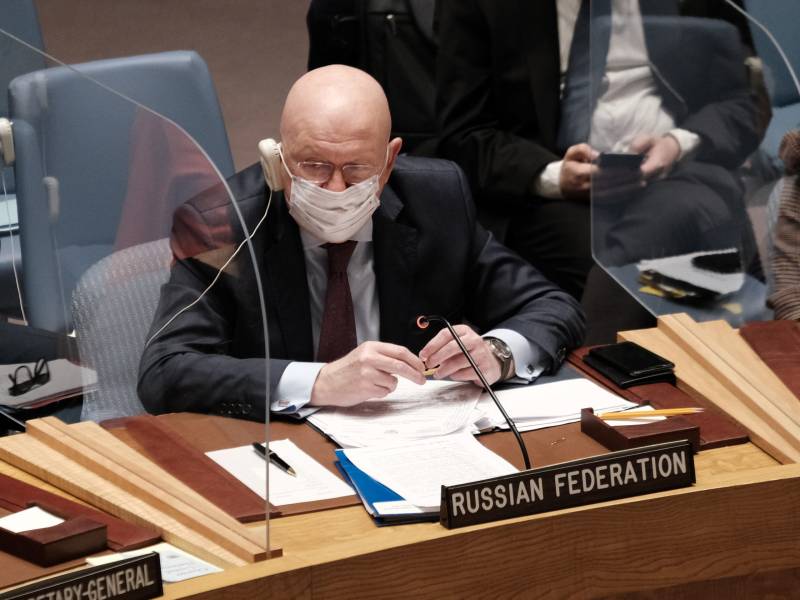The deterioration in relations between Moscow and the West came after Russia's recognition of the independence of the Donetsk and Lugansk People's Republics and the launch at their request of the Russian special military operation in Ukraine to carry out the "demilitarization" and "denazification" of the country.
The US has designated 12 people from the Russian mission to the UN as personae non gratae and demanded that they leave the country by March 7, Russian envoy to the UN, Vasily Nebenzia said on Monday.
Nebenzia described the measure taken by the US as yet "another hostile step" against the Russian mission.
"Just received information that the US authorities have undertaken another hostile action against the Russian Mission to the United Nations, grossly violating their commitments on the [UN-US] Host Country Agreement that they undertook, telling us that they're announcing 12 people from the personnel of the Russian Mission personae non gratae, and demanding that they leave by the 7th of March," Nebenzia said.
Nebenzia was at the beginning of his press briefing set to mark the end of Russia's UN Security Council presidency when he received a phone call informing him about the latest US move.
According to the envoy, the expulsion of Russian diplomats from Russia's Permanent Mission to the UN shows the United States' disrespect for its obligations under the UN Charter and the host country agreement.
Answering a question about whether the visas of Russian diplomats who were ordered to leave the mission are running out, Nebenzia said that the Russian mission has many diplomats whose visas have not been extended. They can stay in the US, continue to work in the mission, but this means that if they leave the US, then it is "100% guaranteed" that they will not be able to return, because they will not receive visa extensions.
Also during the briefing, Nebenzia said that Kiev's readiness for denazification and demilitarization would be a step towards ending the Russian operation in Ukraine.
Speaking about the multiple fake news reports including regarding the alleged bombing of Ukraine's civilian infrastructure by the Russian military, the envoy said that reports of civilian deaths in Kharkov, explosions in Kiev must be verified, as they likely are not credible.
"The reports ... may not be credible at all. We have regular briefings by our Ministry of Defense which maintains that we are not targeting civilian objects in Ukraine nor the cities as such. So these reports about bombing of Kharkov or explosions in Kiev should be verified," Nebenzia said when asked what Russia is doing to prevent deaths among civilians in Ukraine amid reports of casulties from alleged shelling of Kharkov.
When asked about video footage depicting a residential building in Kiev hit by an airstrike, Nebenzia said that Russia does not bomb residential areas.
"I do not have this information. We saw some footage of buildings partly destroyed. But it was then said and confirmed by our military that was not our missiles, but either a plane of Ukraine or a ... missile that went into that building. We didn't bomb residential areas of Kiev," Nebenzia said.
Earlier in the day, Nebenzia underscored for the international community that Moscow has no plans to "occupy" Ukraine, and Russian forces pose no threat to the Ukrainian civilians or infrastructure.
He highlighted that the actions of Ukraine itself are the cause of the current situation, stressing that over the course of the crisis in Donbas, Kiev "sabotaged and flouted its obligations under the Minsk package of measures [Minsk agreements of 2015]."
Moreover, the Russian envoy pointed out that Ukrainian President Volodymyr Zelensky has shown his inability to oppose the radicals in power in Kiev.
Nebenzia emphasized that the real power in Ukraine belongs to the radicals and Nazis, who have their own agenda. And Zelensky has demonstrated that he is weak, that he does not have the political will and strength to resist those radicals who are the main political force in today's Ukraine, according to the diplomat.
After months of escalation and weeks of continuous attacks by Ukrainian forces in the Donbas conflict zone, the Russian army and Donbas militia forces launched a military operation in Ukraine on Thursday. The US and its allies retaliated by imposing further sanctions on Russia and offering Kiev an additional $850 million in armaments.






